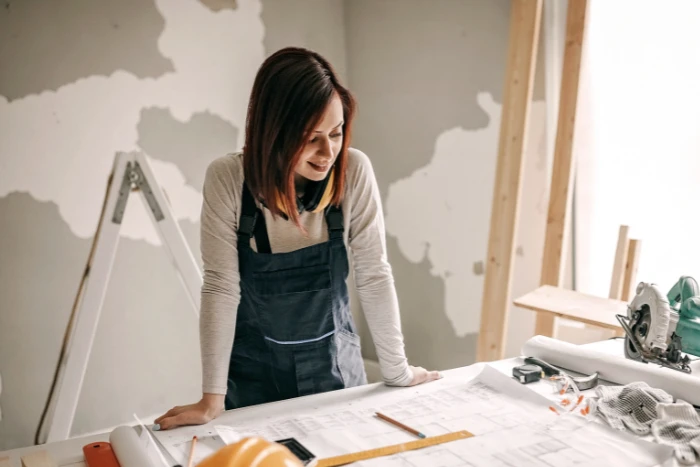Your home isn't just where you live – it's your biggest investment. Over the years, you've watched your property value grow, building equity that could unlock the home upgrades you've always wanted. Whether you're dreaming of a modern kitchen, energy-efficient windows, or a luxurious bathroom remodel, your home equity might be the key to making it happen.
Let's explore how you can tap into this valuable resource to transform your living space while potentially increasing your home's value even more.
What Is Home Equity and How Does It Work?
Home equity is the difference between what your house is worth and what you still owe on your mortgage. Think of it as your ownership stake in your property. If your home is valued at $300,000 and you owe $200,000 on your mortgage, you have $100,000 in equity.
This equity grows in two ways: as you pay down your mortgage principal and as your home's value increases over time. The beauty of home equity is that you can borrow against it at typically lower interest rates than credit cards or personal loans.
Most lenders allow you to borrow up to 80-85% of your home's value, minus what you still owe. Using our example above, you might qualify to borrow around $40,000-$55,000 for home improvement projects.
Popular Ways to Access Your Home Equity
Home Equity Line of Credit (HELOC)
A HELOC works like a credit card secured by your home. You get approved for a credit limit and can draw money as needed during a "draw period" (usually 10 years). This flexibility makes HELOCs perfect for home improvement projects where costs might vary.
Best for: Kitchen remodels, bathroom renovations, or projects where you need funds at different stages.
Home Equity Loan
Also called a second mortgage, this option gives you a lump sum upfront with fixed monthly payments. You'll know exactly what you owe each month, making budgeting easier.
Best for: Major projects with known costs like a new roof, HVAC system replacement, or home addition.
Smart Home Improvement Projects That Add Value
Energy-Efficient Upgrades
Upgrading your home's energy efficiency often provides excellent returns on investment while reducing monthly utility bills.
New Windows: Energy-efficient windows can recoup 70-80% of their cost in added home value. They also reduce heating and cooling costs year-round. Modern windows with double or triple panes and low-E coatings can dramatically improve your home's comfort.
Insulation Improvements: Adding insulation to your attic, walls, or basement might not be glamorous, but it's one of the most cost-effective home improvements. Better insulation can reduce energy bills by 10-50% depending on your current setup.
HVAC System Upgrades: A new furnace or central air system can increase your home's value while improving comfort and efficiency. High-efficiency units often qualify for tax credits, stretching your home equity dollars further.
Roof Replacement
A new roof protects your entire investment and typically recoups 60-70% of its cost in added value. If your roof is over 20 years old or showing signs of wear, using home equity for this improvement makes financial sense.
Kitchen Remodeling
Kitchen renovations consistently rank among the most valuable home improvements. Even a minor kitchen remodel can recoup 70-80% of costs, while a major renovation can transform your daily life and significantly boost your home's appeal to future buyers.
Focus on updates that provide the biggest impact:
- New countertops and backsplash
- Updated appliances
- Fresh paint and lighting
- Modern cabinet hardware or refinishing
Bathroom Renovations
Bathroom remodels offer strong returns, especially when you're updating outdated fixtures or layouts. A mid-range bathroom renovation typically recoups 60-70% of its cost.
Consider improvements like:
- Walk-in showers or soaking tubs
- Dual vanities
- Improved lighting and ventilation
- Modern tile and fixtures
Making Smart Financial Decisions
Calculate Your True Costs
Remember that borrowing against your home equity isn't free. Factor in:
- Interest payments over the loan term
- Closing costs and fees
- Property tax increases from higher home value
- Insurance adjustments
Prioritize Projects Strategically
Start with improvements that enhance safety, efficiency, or prevent costly problems later. A new roof or HVAC system protects your investment, while cosmetic updates can wait.
Get Multiple Quotes
For any major project, get at least three detailed quotes from licensed contractors. This helps you budget accurately and avoid borrowing more than necessary.
Consider Your Timeline
If you're planning to sell within a few years, focus on improvements with high return rates. If you're staying long-term, prioritize projects that improve your daily quality of life.
Potential Risks to Consider
Using home equity means your house secures the debt. If you can't make payments, you could face foreclosure. Only borrow what you can comfortably repay, and maintain an emergency fund for unexpected expenses.
Also, be realistic about project costs. Home improvement projects often exceed initial budgets by 10-20%. Plan accordingly to avoid financial stress.
Paying for Your Project: When you consider updates to your home it is useful to decide whether to save money ahead of time or finance some portion of the cost. Saving ahead of time makes sense for many smaller updates. If you're interested in potentially earning a higher interest rate to help you reach your savings goal more quickly, you might want to explore options like the SCU Direct savings account. If you want to get started immediately look into a HELOC, Home Equity Loan, or Home Improvement loan. Each one has distinct advantages, and considerations for homeowners.
More Information:
HELOCs Explained | HELOC Draw Period | Loan to Value (LTV)
At SCU Credit Union we offer our members home equity lines of credit and home equity loans with competitive rates and flexible terms. For Home Equity Lines of Credit, we lend up to 80% of the assessed value or up to 80% of the appraised value less the remaining balance on your first mortgage on 1-4 family owner occupied residences.
You can apply online or stop in at one of our branches for assistance or reach out to our member service call center at 877-661-3300.


